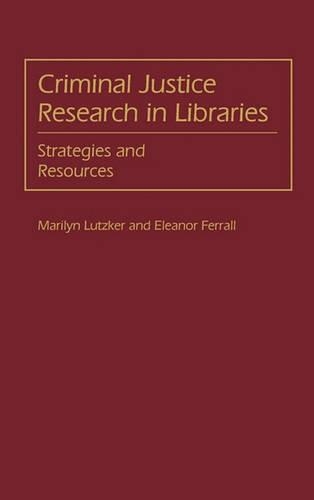
Criminal Justice Research in Libraries: Strategies and Resources
(Hardback)
Publishing Details
Criminal Justice Research in Libraries: Strategies and Resources
By (Author) J E. Ferrall
Bloomsbury Publishing PLC
Greenwood Press
26th March 1986
United States
Classifications
Tertiary Education
Non Fiction
Legal systems: courts and procedures
364.0722
Physical Properties
Hardback
183
Description
Because of its eclectic nature, criminal justice can be a difficult discipline to research. This readable guide should help students through the maze of data. Choice Lutzker and Ferrall skillfully introduce the student, professor, or researcher to the sources in the field and suggest logical ways of approaching them when doing research. Reference Books Journal
Reviews
Because of its eclectic nature, criminal justice can be a difficult discipline to research. This readable guide should help students through the maze of data. The first section traces the history of crime literature, followed by discussion of the process of information flow, computer and manual bibliographic searching, and efficiency in research. The second section contains varied sources from the previous (card catalog) to the less obvious (microfiche news broadcasts, and paperless newspapers). Special problems treated in section three include methods of locating legal and primary historical source materials, and criminal justice sources in other countries. Appendixes have selected listings of directories, national commission reports, and pertinent subject headings. An author/title index completes the handbook.... Recommended for social science collections in academic libraries.-Choice
This guide to the literature was written by two librarians who work primarily with criminal justice literature. The book is well organized in three major sections. The first section, entitled Before You Start, ' provides an overview of how information is communicated by criminal justice practitioners.... The second section, Locating Information, ' introduces various reference sources.... Each group of similar sources is explained in an introduction and then the full bibliographic citation for the individual tool is provided along with an annotation.... The third section, Some Special Problems, ' provides the social science researcher with the background necessary to use legal resources, along with guidance on approaching historical research and resources for the study of criminal justice in other countries..... Lutzker and Ferrall skillfully introduce the student, professor, or researcher to the sources in the field and suggest logical ways to approach them when doing research.-Reference Books Bulletin
"Because of its eclectic nature, criminal justice can be a difficult discipline to research. This readable guide should help students through the maze of data. The first section traces the history of crime literature, followed by discussion of the process of information flow, computer and manual bibliographic searching, and efficiency in research. The second section contains varied sources from the previous (card catalog) to the less obvious (microfiche news broadcasts, and paperless newspapers). Special problems treated in section three include methods of locating legal and primary historical source materials, and criminal justice sources in other countries. Appendixes have selected listings of directories, national commission reports, and pertinent subject headings. An author/title index completes the handbook.... Recommended for social science collections in academic libraries."-Choice
"This guide to the literature was written by two librarians who work primarily with criminal justice literature. The book is well organized in three major sections. The first section, entitled Before You Start, ' provides an overview of how information is communicated by criminal justice practitioners.... The second section, Locating Information, ' introduces various reference sources.... Each group of similar sources is explained in an introduction and then the full bibliographic citation for the individual tool is provided along with an annotation.... The third section, Some Special Problems, ' provides the social science researcher with the background necessary to use legal resources, along with guidance on approaching historical research and resources for the study of criminal justice in other countries..... Lutzker and Ferrall skillfully introduce the student, professor, or researcher to the sources in the field and suggest logical ways to approach them when doing research."-Reference Books Bulletin
Author Bio
tzker /f Marilyn
rall /f Eleanor
